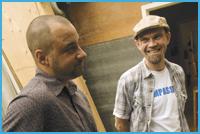The “smoke-friendly” Kindred Café has been raided by Toronto police, a move that Kindred spokesperson Chad Cooke says “doesn’t make any sense.”
The Breadalbane Ave café has been in operation without incident since 2005 but police suddenly swarmed the place Nov 20, arresting two staff members for trafficking and removing nearly everything from the premises.
“They tore everything apart,” says Cooke. “Tables, chairs, TVs, leather couches, even the Xbox… everything to make it difficult for us to reopen. It was really vindictive, really strange.”
“Community complaints,” is the curt response from Toronto drug squad detective constable Douglas Barnard. “More so in the last little while. The reality of the situation is that places like the Kindred Café are flaunting it and at some point the community decides enough is enough and starts making calls to the police. We’re obliged to investigate.”
“Flaunting it?” gapes Cooke. He says the Kindred Café has always had a solid “bring your own” policy towards the marijuana that is smoked on its rooftop patio.
“We’re strict!” says Cooke. “Tourists come in looking to buy marijuana, or we get people on the rooftop patio trying to sell it, and we eject them.” Loyal patrons, says Cooke, “bring their own, we don’t sell any.”
“That’s incorrect.” Barnard says, “You can purchase products laced with THC. We had them tested.”
Cooke scoffs, “How do they measure it?” he asks. But Barnard insists, “You can buy a $13-milkshake at the Kindred Café. Now what do you suppose is in that milkshake?”
Given Toronto’s issues with gun violence and crack cocaine, arresting people over allegedly potty milkshakes seems trivial if not inhumane.
Cooke says the police “were laughing the whole time” as they emptied out the café. “One of them called us a ‘cocksucker,'” he says. “It wasn’t nice.” Ultimately, he sighs, “This whole situation was such a waste of taxpayers’ money.”
“How is it being wasted? We’re doing our job,” says Barnard. “Obviously we probably put more resources into getting crack dealers off the street but if complaints mount, we’re obligated to investigate.” Personally, he says, “My attitude is, if you want to do that kind of stuff, do it at home.”
“Do it at home? Be a shut-in. Give me a break,” says Cooke.
The Kindred Café and places like it, says Cooke, provide a valuable sense of community for people using marijuana to cope with HIV and various other chronic illnesses.
“Don’t get me wrong,” says Barnard. “There were two people in there with medical exemptions. They were not arrested and they were allowed to keep their marijuana. We’re fair.”
In July, Xtra profiled the Toronto Compassion Centre (TCC), newly opened just a stone’s throw from the Kindred Café, in the heart of the Church-Wellesley neighbourhood. Kindred, TCC and the Toronto Hemp Company are all owned by Dominic Cramer.
“The bottom line is that the government should not be in our bedrooms and it should not be making our healthcare decisions for us,” Cramer told Xtra. “People should be free to use whatever medicines they and their doctors feel will help them.”
Cooke told Xtra in July that 42 percent of TCC members are people living with HIV/AIDS. Another TCC employee estimated that as many as one third of those using TCC are gay men.
“From a quality of life point of view anything that will help people with HIV manage their medications better and lead quality lives is a very good thing and it’s something that ACT has always supported,” John Maxwell, director of special projects at the AIDS Committee of Toronto, told Xtra.
Cramer has been charged in connection with the Kindred raid – he wasn’t there at the time. Cooke says that as this story is filed Cramer is scheduled to turn himself in to police.
Cramer declined to speak with Xtra for this story.
“We’ll have to see after Mr Cramer’s been charged and how it’s going to play out,” says Barnard, “Obviously, there’s going to be some conditions upon his release and it’s whether he chooses to follow them or not follow them, you know what I mean?”
Barnard says that Cramer and his employees have been “extremely cooperative” but maintains that the group’s openness was a “heat score” against them.
“They’re making life more difficult for themselves,” he says. “Up until some months ago, I didn’t even know what the Kindred Café was.”
“I find that hard to believe,” says Cooke. “They said the same thing with the raid in 2002 at the compassion centre. ‘We had community complaints, we had no choice, we don’t like to do it’ and so on. I understand that side of it – they’re doing their jobs -but I wish there was another way to deal with it. Yes, there have been complaints but why not approach us rather then raiding us?”
Cooke is frustrated by the police’s heavy-handedness.
“We thought we’d garnered a good relationship with them,” he says.
Still Cooke says the café will be open again within a week. While Canadian courts have ruled pot possession laws unconstitutional, there’s still a sense of legal flux that seems a burden for smokers and police alike.
“I’d agree with that,” says Barnard but, as far as a public demand for decriminalization goes, “That’ll never happen. I’m sorry, but I just don’t see it happening.”
Cooke does. “I just think that the police have made a big mistake and that it’ll be a public relations nightmare for them. They’re going to find that we have community support, not the other way around.”
As the public responds to this surprise attack on personal liberty, says Cooke, “This could end up being a good thing. What seems like a setback could push a leap forward.”


 Why you can trust Xtra
Why you can trust Xtra


